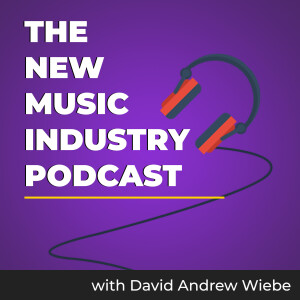
What do you do when a new opportunity comes your way? What criteria do you use to decide which to take on and which to turn down?
In this episode of The New Music Industry Podcast, I share the power of two important words, “yes” and “no”, and how to use them to advance your career.
Download the PDF Transcription
Podcast Highlights:
00:14 – Reflecting on the most important lessons I’ve learned
00:32 – The importance of “yes” and “no”
00:59 – The value of “yes”
01:53 – Taking offers that aren’t what you expected
02:21 – Things I’ve done that weren’t in my wheelhouse
02:38 – Success may not come in the package you expect it to
02:54 – How long should you keep saying “yes”?
03:23 – When you need to start saying “no”
03:55 – 3 criteria to determine which opportunities are most worthwhile
04:40 – Turning down opportunity
05:33 – Where are you in your career right now?
Transcription:
Working on my latest mini-book, The Essential Guide to Music Entrepreneurship: 2018 Edition and the associated bonus content has given me a lot of time to reflect on some of the most important lessons I’ve learned as a music entrepreneur.
Just so you know, the bonus content for the mini-book isn’t available just yet but it’s coming along.
Regardless, one thing I’ve come to recognize is the importance of two words, “yes” and “no”.
When you’re first getting started in your career, you probably don’t have much by way of contacts, resources, or opportunities. If you’re lucky, you might be starting off with more than others, but for the most part musicians and entrepreneurs tend to start off at zero. They don’t know anyone, they don’t have much by way of money or equipment, and they don’t have venues knocking at their door to book them.
If that describes where you are in your career, you’ll appreciate the value of the word, “yes”, and it’s more powerful than you might think.
You might see other musicians turn down certain gigs or opportunities. It might be because they have other projects or prospects to focus on. Taking a low-paying gig as an in-demand musician doesn’t make much sense, unless the gig offers other significant benefits.
But for you, a low-paying gig might be a great opportunity. You might not see other opportunities on the radar right now, so really any gig would be a step forward.
If you’re professional, you show up on time, and you play a good set, you might make a few more contacts. These people might see potential in you. Granted, if you aren’t that great at your craft, you’re probably not going to get higher paying gigs or better opportunities just yet, but so long as you make just one contact that’s interested in working with you, you can keep connecting the dots from one gig to the next.
It should be noted that people may come to you with offers that aren’t exactly in your wheelhouse or not what you expected. Should you say “no”?
My belief is that you should continue to say “yes” anyway.
You probably don’t have a lot of money coming in, and you still have considerable leeway in your calendar. Most of all, these experiences will cause you to grow. Sure, they may challenge you and put you outside of your comfort zone. But you’ll be hard pressed to find a better way to become more than you are right now.
I’ve done a lot of things through the years that either weren’t in my wheelhouse or I wasn’t good at. I’ve been a laptop salesman, a theater tech, a caretaker, a beverage server, and more.
I may not have been good at those things, but I learned a lot. And, I also found that I got better at some of those things over time.
One of the realities of success is it may not come in the neat little package you expect it to. I talked about this a little bit in episode 97 of the podcast, but I really want to drive this home – you may not end up where you thought you would, but that doesn’t mean you haven’t achieved success.
view more
More Episodes
190 – How to Support the Podcast
 2020-05-07
2020-05-07
 2020-05-07
2020-05-07
188 – New Book: The Music Entrepreneur Code
 2020-04-23
2020-04-23
 2020-04-23
2020-04-23
187 – Catching Up with Dave Chick Part 2
 2020-04-16
2020-04-16
 2020-04-16
2020-04-16
186 – Catching Up with Dave Chick Part 1
 2020-04-09
2020-04-09
 2020-04-09
2020-04-09
184 – Doing Business in the Music Business
 2020-03-13
2020-03-13
 2020-03-13
2020-03-13
183 – Is Social Media the Answer?
 2020-03-05
2020-03-05
 2020-03-05
2020-03-05
178 – 3 Impacting Books I Read in 2019
 2020-01-30
2020-01-30
 2020-01-30
2020-01-30
176 – Closing the Chapter on 2019
 2020-01-16
2020-01-16
 2020-01-16
2020-01-16
174 – Let’s Start the New Year with a Bang!
 2020-01-04
2020-01-04
 2020-01-04
2020-01-04
012345678910111213141516171819
Create your
podcast in
minutes
- Full-featured podcast site
- Unlimited storage and bandwidth
- Comprehensive podcast stats
- Distribute to Apple Podcasts, Spotify, and more
- Make money with your podcast
It is Free
- Privacy Policy
- Cookie Policy
- Terms of Use
- Consent Preferences
- Copyright © 2015-2024 Podbean.com





